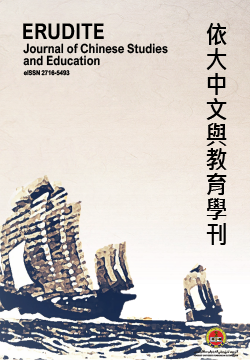论美丽的力量与颠覆:以川端康成《化妆》为例
Research on the Power and Subversion of Beauty Based on Yasunari Kawabata's “Make-up” Short Stories
DOI:
https://doi.org/10.37134/erudite.vol3.2.3.2022Keywords:
化妆, 符号, 镜像, 颠覆, 美丽, 恐惧Abstract
川端康成《化妆》一文以其纤细的视角,洞察人们所忽略的可怖经验——“女孩化妆后的微笑”,进而窥探人类发展史上不为人知的秘密。“化妆”是女性的一种镜像迎合,借男性之视觉、语言、符号标准去映照自己的生命价值。在远古时代,女性深具崇高而神圣的地位,是男性对于生殖器官的崇拜。男性转而假借语言文字创建了一个历史世界(History)试图掩盖女性的崇高性,而女性则逐渐被雕塑成男性眼中“懦弱、附庸、美丽”的形象。男性在符号世界里不知不觉地赋予了女性们美丽的力量,那是男性在颠覆母系社会过程中所遗留的产物,但也成了女性颠覆父权力量的根源。因此“化妆”是男人镜像中对于美丽的依恋与哀愁,但正因如此让女性得以仰赖自己的姿色凝聚一股足以倾国倾城的庞大力量,撼动男性书写的文明。故笔者欲以符号学阐明化妆所指涉的意义,进而运用拉康(Jacques Marie EmileLacan)“镜像理论”(mirror stage)论述女性如何在男性所赋予的镜像中,建构自我的身份属性。
The article “Makeup” by Yasunari Kawabata provides a slender insight into the horrible experience that people overlook – “the smile of a girl with makeup” - and thus peeks into the unknown secrets of human development. “Makeup” is a kind of mirroring catering for women, reflecting their own life values through the visual, linguistic and symbolic standards of men. In ancient times, women had a high and sacred status and were worshipped by men for their reproductive organs. Men turned to language and writing to create a world of history in an attempt to conceal the sublime nature of women, while women were gradually sculpted as “weak, subservient and beautiful” in men's eyes. In the symbolic world, men have unconsciously given women the power of beauty, which is the legacy of men's subversion of matriarchal society, but also the source of women's subversion of patriarchal power. Therefore, “make-up” is the attachment and sorrow for beauty in men'’s mirror image, but because of this, women are able to rely on their beauty to gather a huge power that can overwhelm the country and shake the civilization written by men. Therefore, this paper would like to clarify the meaning of make-up by means of semiotics, using Jacques Marie Emile Lacan's “mirror stage” to discuss how women construct their own identity in the mirror image given by men.
Keywords: Make up, symbolic, mirror image, subversion, beauty, fear
Downloads
References
(一)专著
白居易,顾学颉校点,《白居易集》,北京:中华书局,1979 。
恩格斯,中共中央马克思、恩格斯、列宁、斯大林著作编译局译,《家庭、私有制和国家的起源》,北京:人民出版社,1972。
汉斯•比德曼著,刘玉红、谢世坚、蔡马兰译,《世界文化象征辞典》,桂林:滴江出版社,2000。
马克思,《摩尔根〈古代社会〉一书摘要》,北京:人民出版社,1965。
川端康成著,叶渭渠译,《人的脚步声——掌小说全集》,桂林:广西师范大学出版社,2001。
福原泰平著,王小峰、李濯凡译,《拉康:镜像阶段》,石家庄:河北教育出版社,2001。
班固著,张传玺等译,《汉书》,陕西:三秦出版社,2004。
拉康著,褚孝泉译,《拉康选集》,上海:三联书店,2001。
福柯著,谢强、马月译,《知识考古学》,北京:生活读书新知三联书店,2004。
西蒙娜•德•波伏娃,陶铁柱译,《第二性》,北京:中国书籍出版社,1998。
西西蒙娜•德•波伏娃,晓宜、张亚莉等译,南祎校,《女性的秘密》,北京:中国国际广播出版社,1988。
沃尔特·惠特曼著,赵萝蕤译,《草叶集》,上海:上海译文出版社,1991。
诺伯特•威利著,文一茗译,《符号自我》,四川:四川教育出版社,2011。
弗吉尼亚·伍尔夫著,王还译,《一间自己的屋子》,北京:三联书店,1989。
特里·伊格尔顿著,伍晓明译,《二十世纪西方文学理论》(纪念版),北京:北京大学出版社,2018。
玛丽·依格尔顿主编,胡敏等译,《女权主义文学理论》,长沙:湖南文艺出版社,1989。
约翰·弥尔顿著、金发燊译,《失乐园》第十卷,长沙:湖南人民1987。
詹乔•弗雷泽著,徐育新、汪培基、张泽石译,《金枝》,北京:中国民间文艺出版社,1987。
刘剑雯,《性别与话语权》,香港:中华书局,2016。
杜声锋,《拉康的结构主义精神分析学》,上海:三联书店,1988。
杨伯峻,《春秋左传注》,北京:中华书局,1990。
杨莉馨,《异域性与本土化:女性主义诗学在中国的流变与影响》,北京:北京大学出版社,2005。
林树明,《多维视野中的女性主义文学批评》,北京:中国社会科学出版社,2004。
欧荣等著,《“双重意识”——英国作家戴维•洛奇研究》,上海:复旦大学出版社,2011。
王逢振等编,《最新西方文论选》,桂林:漓江出版社,1991。
禹燕,《女性人类学》,上海:东方出版社,1989。
翦伯赞,《先秦史》,北京:北京大学出版社,1999。
赵毅衡,《符号学》,南京:南京大学出版社,2012。
赵毅衡,《符号学原理与推演》,南京:南京大学出版社,2011。
鲁迅校录,王中立译注,《唐宋传奇集》,天津:天津古籍出版社,2002。
(二)期刊文献
吕大吉,〈概说宗教禁欲主义〉,《中国社会科学》,总第5期(1989年)
南帆:〈躯体修辞学:肖像与性〉,《文艺争鸣》,总第4期(1996年)
赵思运,〈呻吟中的突围——女性诗歌对男权镜像的解构与颠覆〉,《文艺争鸣》,总第1期(2001年)
赵毅衡,〈文化符号学中的“标出性”〉,《文艺理论研究》,总第3期(2008年)
马西莫•莱昂(钱亚旭译),〈从理论到分析:对文化符号学的深思〉,《符号与传媒》,总第2期(2013年)。
Downloads
Published
Issue
Section
License
Copyright (c) 2022 Ming Ren Lee

This work is licensed under a Creative Commons Attribution-NonCommercial-ShareAlike 4.0 International License.





